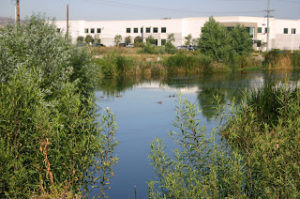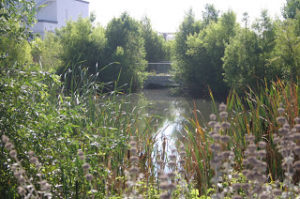What is a wetland?
 Wetlands are among the most distinct and productive ecosystems on earth providing habitat to diverse communities of plant, animal and fish species. Wetlands also play a critical role in maintaining the health of the natural environment by filtering chemical and biological components from ground and surface water.
Wetlands are among the most distinct and productive ecosystems on earth providing habitat to diverse communities of plant, animal and fish species. Wetlands also play a critical role in maintaining the health of the natural environment by filtering chemical and biological components from ground and surface water.Wetlands are the link between land and water. They are transition zones where the flow of water, the cycling of nutrients, and the energy of the sun meet to produce unique ecosystems characterized by hydrology, soils, and vegetation – making these areas very important features of a watershed. Wetlands contribute to the natural processes that keep our water clean – including groundwater and the water in our lakes, rivers and streams.
Wetlands are home to more than one-third of North America’s threatened and endangered species. For many animals and plants, wetlands are the only places they can live. For others, wetlands provide important food, water, or shelter. Many of the North American breeding bird populations feed, nest, and raise their young in wetlands. Migratory waterfowl use wetlands as resting, feeding, breeding, or nesting grounds for at least part of the year.
the only places they can live. For others, wetlands provide important food, water, or shelter. Many of the North American breeding bird populations feed, nest, and raise their young in wetlands. Migratory waterfowl use wetlands as resting, feeding, breeding, or nesting grounds for at least part of the year.
 the only places they can live. For others, wetlands provide important food, water, or shelter. Many of the North American breeding bird populations feed, nest, and raise their young in wetlands. Migratory waterfowl use wetlands as resting, feeding, breeding, or nesting grounds for at least part of the year.
the only places they can live. For others, wetlands provide important food, water, or shelter. Many of the North American breeding bird populations feed, nest, and raise their young in wetlands. Migratory waterfowl use wetlands as resting, feeding, breeding, or nesting grounds for at least part of the year.Information from: http://www.downatthepond.ca/
